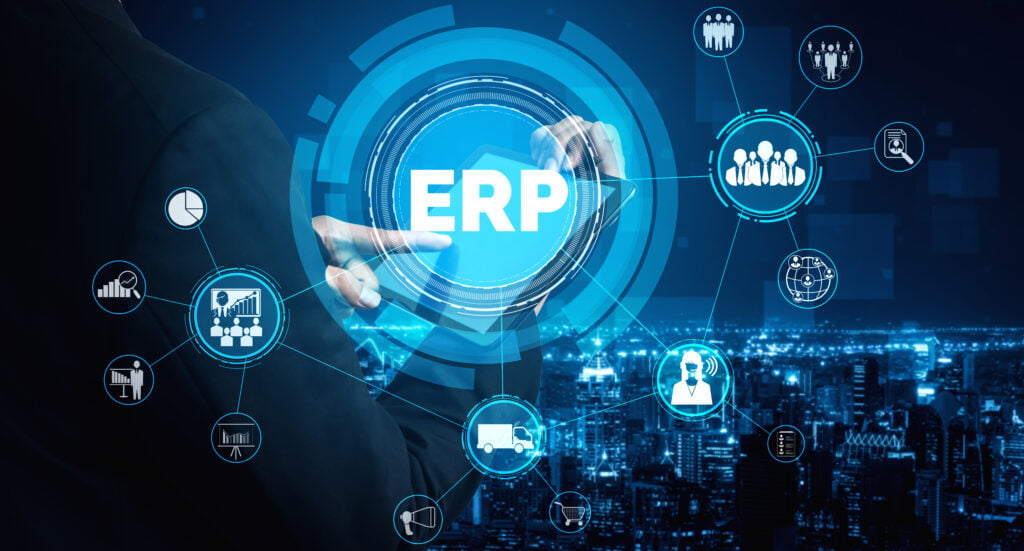Business Central vs Dynamics 365 – which one should you choose?
Which is better – Business Central or Microsoft Dynamics 365? It’s a question that comes up a lot, and of course the answer is ‘It depends what you want it to do’. But let’s break that down a bit and explore what each system offers, and whether it’s possible to just use one.
What’s the difference between Business Central and Dynamics 365?
Microsoft Dynamics 365 Business Central is an enterprise resource planning (ERP) system designed to help you manage the supply chain needs of your organisation. It’s largely focused on things like logistics, inventory planning, and billing, but does have other capabilities too. Businesses use ERPs like Business Central to ensure that resource planning is aligned across the business, and that everyone has access to and can learn from the same information.
Dynamics 365 is Microsoft’s Customer Relationship Management (CRM) system, which provides a full and comprehensive history of the relationship (i.e. interactions) with a customer, giving the insights needed to progress that relationship in the future. Like the ERP, the CRM aids alignment across the business, so that every department that has a touch point with the customer (e.g. marketing, sales and after sales) has access to the same information. The better your CRM, the less likely you are to miss sales opportunities. Like Business Central, Dynamics 365 has additional capabilities, but its core strength is in customer relationship management.
Can you use Dynamics 365 as an ERP?
Yes, to an extent. Dynamics 365 does have some capabilities that crossover with Business Central – it was originally formed from a combination of ERP and CRM systems, after all. But as Dynamics 365 has evolved, it has developed its CRM capabilities and Business Central has grown as the core ERP tool. Essentially, these are two separate systems built with different goals in mind.
Can you use Business Central as a CRM?
Yes, up to a point. But its capabilities are limited, so it depends what you want from your CRM. If you’re looking for basic functionality, Business Central has a Relationship Management tool that enables you to manage contact information, opportunity tracking, targeted campaigns, and so on. This information will be available across the organisation and will ensure everyone is on the same page when it comes to customer history. For more advanced capabilities, however, you’ll need a purpose-built CRM.

What does Dynamics 365 offer that you can’t get from Business Central?
Customization
Dynamics 365 can be customized according to your sales process, enabling you to have a CRM that perfectly fits your market, your workflows, and your buyers’ journey. The more customized your CRM, the more you can make it work for you, using business and process automation, purpose-built templates, and more. CRMs for membership organisations are entirely different than CRMs for B2B service providers, for example, which will be different again to a retailer’s CRM. If you’re using a one-size-fits-all CRM system, you could be missing out on opportunities for more personalised interactions with your customers.
Additional capabilities
Microsoft Dynamics 365 is a modular solution, which means it offers many capabilities via different apps, which you can add on. These include things like customer behaviour modelling, self-service tools, marketing campaign management, and a sales module that provides insights regarding prospective customer sources and customer engagement data, as well as monitoring sales productivity and performance.
This is advanced CRM stuff – the kind that goes beyond managing data and becomes a core tool in the sales process, helping companies grow and develop.
Automation
Business process automation and Robotic process automation reduce the admin burden on workers, giving them more ‘time on tools’ to get on with their actual jobs. Marketing automation tools similarly enable workers to achieve more with less, expanding their reach and their effectiveness by automating marketing campaigns. All these tools are available with Dynamics 365 and can be used to increase efficiency and performance. For example, you can use marketing automation tools to track the buyer’s journey, see how they engage with your content, and use that data to adjust your approach for maximum effect.

What does Business Central offer that you can’t get from Dynamics 365?
Enhanced data
As a purpose-built ERP solution, Business Central provides centralised and real-time reporting of all connected data, such as customer service requests, cash flow, inventory, etc. so that you can easily identify trends and make decisions accordingly. You can also integrate Business Central with Power BI for enhanced data visualisation, which helps turn data into actionable insights.
A different kind of automation
Like Dynamics 365, Business Central also has the capability to use automation to make workflows more efficient and more effective. Integration with tools like Dynamics Copilot eases the burden of repetitive manual work and provides AI-based insights that help business decision-making.
Advanced supply chain management
The supply chain is where Business Central really comes into its own, providing unrivalled visibility on inventory, purchase orders, sales orders, and production orders, as well as warehouse management solutions that help optimise the way you structure your warehouse operations.

How to make the most of Business Central and Dynamics 365
The good news is – you don’t have to choose between Business Central and Microsoft Dynamics 365. They’re all part of the same ecosystem and can be integrated seamlessly to give you the best of both worlds. All the Microsoft 365 systems work on the same common data model, ensuring easy communication and alignment between tools.
Integrating Dynamics 365 with Business Central, Teams, Outlook, Office, SharePoint, LinkedIn Sales Navigator, etc. enables you to work more efficiently, without wasting time switching between apps or repeatedly inputting information, which can lead to mistakes. Having a fully functioning ERP system and a customised CRM maximises your opportunities for efficiency across the business, providing end-to-end support for both your organisation and your customers.
Get in touch with us today to find out how we can help you with your CRM and ERP systems.


